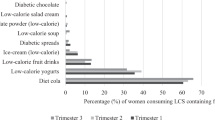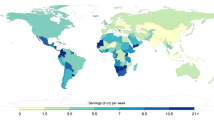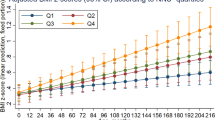Abstract
The aim of this study was to investigate the relationship between the intake of sugar-sweetened (SS) and artificially sweetened (AS) cola beverages during pregnancy and the risk of preterm delivery (PTD). At baseline (2007–2010), 8914 pregnant women were recruited to the Born in Bradford birth cohort study at 24–28 weeks of pregnancy. Women completed a questionnaire describing their health and lifestyle behaviours, including their consumption of AS and SS cola beverages reported as cups per day, which were then linked to maternity records. The relationship between SS and AS cola beverage consumption was examined using logistic regression analyses. No relationship was observed between daily AS cola beverage consumption and PTD. Women who drank four cups per day of SS cola beverages had higher odds of a PTD when compared with women who did not consume these beverages daily. We conclude that high daily consumption of SS cola beverages during pregnancy is associated with increases in the rate of PTD.
This is a preview of subscription content, access via your institution
Access options
Subscribe to this journal
Receive 12 print issues and online access
$259.00 per year
only $21.58 per issue
Buy this article
- Purchase on Springer Link
- Instant access to full article PDF
Prices may be subject to local taxes which are calculated during checkout
Similar content being viewed by others
References
Popkin BM, Nielsen SJ . The sweetening of the world's diet. Obes Res 2003; 11: 1325–1332.
Bellisle F, Drewnowski A . Intense sweeteners, energy intake and the control of body weight. Eur J Clin Nutr 2007; 61: 691–700.
British Soft Drinks Association. The 2012 UK Soft Drinks Report. 2012.
Halldorsson TI, Strom M, Petersen SB, Olsen SF . Intake of artificially sweetened soft drinks and risk of preterm delivery: a prospective cohort study in 59,334 Danish pregnant women. Am J Clin Nutr 2010; 92: 626–633.
Englund-Ogge L, Brantsaeter AL, Haugen M, Sengpiel V, Khatibi A, Myhre R et al. Association between intake of artificially sweetened and sugar-sweetened beverages and preterm delivery: a large prospective cohort study. Am J Clin Nutr 2012; 96: 552–559.
Kajantie E, Osmond C, Barker DJ, Eriksson JG . Preterm birth—a risk factor for type 2 diabetes? The Helsinki birth cohort study. Diabetes Care 2010; 33: 2623–2625.
Boyle EM, Poulsen G, Field DJ, Kurinczuk JJ, Wolke D, Alfirevic Z et al. Effects of gestational age at birth on health outcomes at 3 and 5 years of age: population based cohort study. BMJ 2012; 344: e896.
Wright J, Small N, Raynor P, Tuffnell D, Bhopal R, Cameron N et al. Cohort profile: The Born in Bradford multi-ethnic family cohort study. Int J Epidemiol 2013; 42: 978–991.
Acknowledgements
BiB was only possible because of the enthusiasm and commitment of the children and parents in BiB. We are grateful to all the participants, health professionals and researchers who have made BiB happen. This work was funded by the Institute for European expertise in physiology and also by an National Institute for Health Research (NIHR) Collaborations for Leadership in Applied Health Research and Care (CLAHRC) implementation grant (CLAHRC implementation grant (KRD/012/001/006)).
Disclaimer
The funders had no role in the design or interpretation of the results of this study. This paper presents independent research commissioned by the NIHR under the CLAHRC programme for Leeds, York and Bradford. The views expressed are those of the author(s) and not necessarily those of the National Health Service, the NIHR or the Department of Health.
Author information
Authors and Affiliations
Corresponding author
Ethics declarations
Competing interests
The authors declare no conflict of interest.
Rights and permissions
About this article
Cite this article
Petherick, E., Goran, M. & Wright, J. Relationship between artificially sweetened and sugar-sweetened cola beverage consumption during pregnancy and preterm delivery in a multi-ethnic cohort: analysis of the Born in Bradford cohort study. Eur J Clin Nutr 68, 404–407 (2014). https://doi.org/10.1038/ejcn.2013.267
Received:
Revised:
Accepted:
Published:
Issue Date:
DOI: https://doi.org/10.1038/ejcn.2013.267
Keywords
This article is cited by
-
Assessing sugar-sweetened beverage consumption in early pregnancy using a substance abuse framework
Scientific Reports (2023)
-
Sugar-Sweetened Beverage Intake Among Pregnant and Non-pregnant Women of Reproductive Age
Maternal and Child Health Journal (2020)
-
Health outcomes of non-nutritive sweeteners: analysis of the research landscape
Nutrition Journal (2017)



